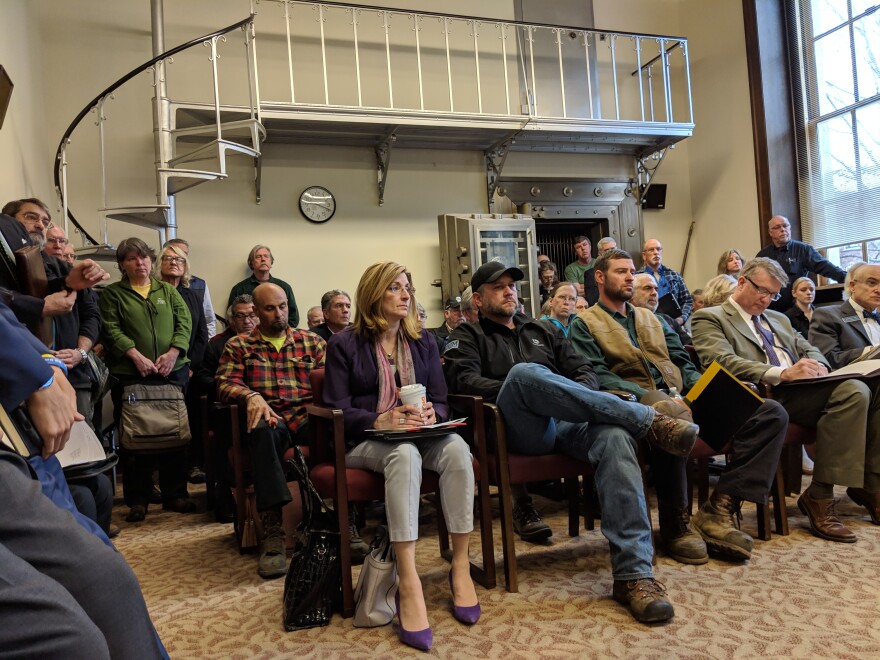State senators heard three hours of testimony Tuesday from dozens in the New Hampshire forest products industry who support a plan to resurrect biomass energy subsidies.
The plan, proposed in an amendment on an unrelated bill, is a version of a law passed last year that's since stalled in a legal challenge before the Federal Energy Regulatory Commission.
The state’s biomass plants have also appealed to the state Supreme Court for the law to be enforced.
Timber and biomass workers say all this uncertainty has already chilled their industry, leading power plants to idle and orders of woodchips and equipment to go undelivered.
Without a financial boost – from the subsidy plan that would last three years – they say they could lose hundreds or thousands of jobs.
"I look at this as not a subsidy – I look at this as an investment,” said Shelagh Connelly, who runs a business in Holderness that recycles burned biomass as fertilizer. “It affects the little people like me and my employees. And I just ask you – I beseech you! Please keep biomass alive in New Hampshire."
Others suggested the state’s timber industry could collapse without the market for low-grade wood that the biomass plants provide.
They say this would hurt local economies across the state, inhibit responsible forest management and prompt clear-cutting of forests and the closure of recreation areas on private lands.
Lawmakers’ bipartisan subsidy proposal would have utility ratepayers subsidize biomass energy production by requiring utilities to buy a new kind of energy generation credit from biomass power plants. It would not require utilities to buy the electricity.
“This gives us an opportunity to live for three more years and look at market conditions when those three years are over,” said Michael O’Leary, the asset manager for the Bridgewater Power biomass plant.
Lawmakers argue the structure of their amendment avoids the regulatory problems that have plagued the previous version of the law, which required purchase of actual electricity at a set rate – something the state is not allowed to prescribe.

Proponents also say the new subsidy proposal would add only a dollar or two to most ratepayers’ monthly electric bills, though some larger energy users could pay more.
Critics say no ratepayers should be asked to directly subsidize a struggling industry.
Residential ratepayer advocate Don Kreis, who works alongside the Public Utilities Commission, says current law is clear that the affected utility rates should only include costs related to providing utility service. And he says existing rates meet that standard.
“I surely do not want to put one Granite Stater out of work,” Kreis said. “I ask only that as you consider the proposed amendment, you remember New Hampshire’s residential ratepayers and the constitutional provisions that protect them.”
Kreis is part of the legal challenge against last year’s biomass subsidies. That case is led by the New England Ratepayers Association, which often lobbies on behalf of industrial energy users but does not disclose its membership.
Executive director Marc Brown suggested any subsidy for the biomass industry should come from the general fund.
“Nobody wants to see people lose jobs. Nobody takes pleasure in that,” he said. “But this is essentially a tax on electricity consumers, aimed at supporting a particular segment of the economy.”
"This gives us an opportunity to live for three more years." --Michael O'Leary, Bridgewater Power
Other critics suggested the rooms & meals tax as a source for biomass aid money.
The proposed amendment, like last year’s law, would also benefit a controversial trash-burning power plant in Penacook, run by Portsmouth-based Wheelabrator Technologies.
Activists cite environmental concerns about toxic air emissions from the plant, which are within what they describe as overly lax state and federal standards.
Katie Lajoie of Concord was one of a handful of people, including a legislator, who argued the Wheelebrator plant should be written out of the subsidy amendment.
And Lajoie says for biomass or trash-fired energy, any benefits from subsidies would be short-lived.
"There's no talk about planning for the future,” she said. “What happens in three years? We're going to be back here… wanting more assistance to keep these plants going."
Biomass industry representatives say a three-year boost would give them time to assess market conditions and plan for long-term sustainability.
Last year’s subsidies had bipartisan support in the legislature. This year’s iteration has bipartisan sponsorship and support from the authors of the law to which it’s attached.
That law would set up a study commission on microgrids, or small local energy systems that can operate independently from the grid.
Governor Chris Sununu has generally opposed this form of biomass subsidies. He vetoed last year’s version of the bill. Legislators overturned that veto by one vote.
This post has been updated.








